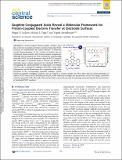Graphite-Conjugated Acids Reveal a Molecular Framework for Proton-Coupled Electron Transfer at Electrode Surfaces
Author(s)
Jackson, Megan; Pegis, Michael L.; Surendranath, Yogesh
Downloadacscentsci.9b00114.pdf (1.772Mb)
Terms of use
Metadata
Show full item recordAbstract
Proton-coupled electron-transfer (PCET) steps play a key role in energy conversion reactions. Molecular PCET reactions are well-described by "square schemes" in which the overall thermochemistry of the reaction is broken into its constituent proton-transfer and electron-transfer components. Although this description has been essential for understanding molecular PCET, no such framework exists for PCET reactions that take place at electrode surfaces. Herein, we develop a molecular square scheme framework for interfacial PCET by investigating the electrochemistry of molecularly well-defined acid/base sites conjugated to graphitic electrodes. Using cyclic voltammetry, we first demonstrate that, irrespective of the redox properties of the corresponding molecular analogue, proton transfer to graphite-conjugated acid/base sites is coupled to electron transfer. We then show that the thermochemistry of surface PCET events can be described by the pKa of the molecular analogue and the potential of zero free charge (zero-field reduction potential) of the electrode. This work provides a general framework for analyzing and predicting the thermochemistry of interfacial PCET reactions.
Date issued
2019-05Department
Massachusetts Institute of Technology. Department of ChemistryJournal
ACS central science
Publisher
American Chemical Society (ACS)
Citation
Jackson, Megan N., Michael L. Pegis and Yogesh Surendranath. “Graphite-Conjugated Acids Reveal a Molecular Framework for Proton-Coupled Electron Transfer at Electrode Surfaces.” ACS central science 5 (2019): 831-841 © 2019 The Author(s)
Version: Final published version
ISSN
2374-7951
2374-7943